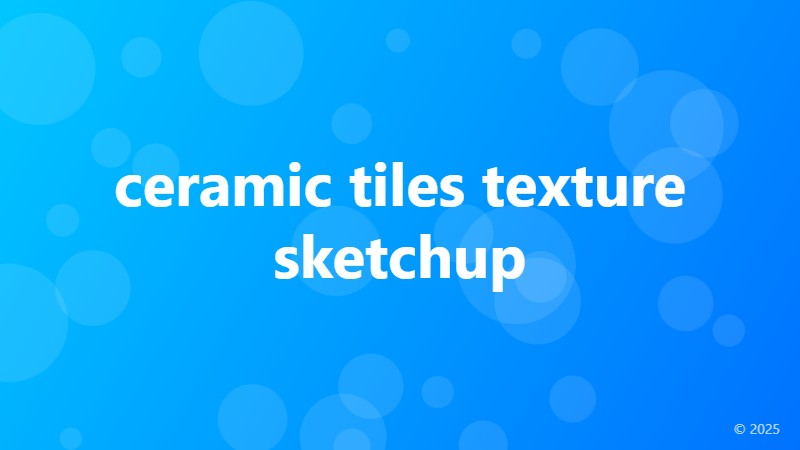ceramic tiles texture sketchup

Adding Realism to Your Designs: The Importance of Ceramic Tiles Texture in SketchUp
When it comes to creating realistic designs in SketchUp, one of the most crucial elements to consider is texture. Ceramic tiles, in particular, can add a level of authenticity to your designs that's hard to replicate with plain colors or materials. In this article, we'll explore the importance of ceramic tiles texture in SketchUp and provide some tips on how to incorporate them into your designs.
Why Ceramic Tiles Texture Matters in SketchUp
In real-life scenarios, ceramic tiles are often used in various applications, from flooring to wall decorations. As such, including them in your SketchUp designs can make a significant difference in terms of realism. With ceramic tiles texture, you can:
- Create more realistic and immersive environments
- Add depth and visual interest to your designs
- Showcase your design skills and attention to detail
Moreover, using ceramic tiles texture in SketchUp can also help you to better communicate your design ideas to clients or stakeholders. By presenting a more realistic and detailed design, you can ensure that everyone is on the same page, reducing the risk of miscommunication and potential errors.
How to Add Ceramic Tiles Texture in SketchUp
Fortunately, adding ceramic tiles texture in SketchUp is relatively straightforward. Here are the general steps to follow:
First, you'll need to find a suitable ceramic tiles texture image. You can either create your own or search for free resources online. Once you have the image, follow these steps:
- Open your SketchUp project and select the surface where you want to apply the ceramic tiles texture
- Go to the Materials tab and click on the "Create Material" button
- Upload your ceramic tiles texture image and adjust the settings as needed
- Apply the material to your selected surface
By following these steps, you can easily add ceramic tiles texture to your SketchUp designs and take your projects to the next level.
Best Practices for Working with Ceramic Tiles Texture in SketchUp
While adding ceramic tiles texture to your SketchUp designs can be a game-changer, there are some best practices to keep in mind to ensure you get the most out of this feature:
- Use high-quality texture images to ensure a realistic look
- Adjust the texture scale and orientation to match your design needs
- Experiment with different materials and textures to create a unique look
By following these best practices, you can create stunning and realistic designs that showcase your skills and attention to detail.
In conclusion, incorporating ceramic tiles texture into your SketchUp designs can make a significant difference in terms of realism and visual appeal. By understanding the importance of ceramic tiles texture and following the tips outlined in this article, you can take your designs to the next level and impress your clients or stakeholders.